- Home
- Michael Swanwick
Vacuum Flowers
Vacuum Flowers Read online
EARLY BIRD BOOKS
FRESH EBOOK DEALS, DELIVERED DAILY
BE THE FIRST TO KNOW—
NEW DEALS HATCH EVERY DAY!
Praise for the Writing of Michael Swanwick
The Iron Dragon’s Daughter
A New York Times Notable Book
“Eerie … extraordinary … Dickens meets Detroit, full of grimy, toiling waifs, dark factories, trolls with boomboxes, and sleek, decadent high elves … Sordid, violent, funny, absurd, angry, by turns, as intense in its pleasures as in its pains … Swanwick takes huge risks here, and reaps big rewards.” —Locus
“Entertaining reading … Flamboyant … Grotesquely Dickensian.” —Newsday
In the Drift
“This episodic tale of life, war and survival in post-meltdown Pennsylvania builds a potent new myth from the reality of radioactive waste.” —George R. R. Martin
“Shocking … powerful.” —Daily News (New York)
“A powerful and affecting novel … Chilling, believable and uncomfortably close to home.” —The Evening Sun (Baltimore)
Bones of the Earth
“Jurassic Park set amid the paradox of time travel … I dare anyone to read the first chapter and not keep reading all the way through to the last shocking page.” —James Rollins, New York Times–bestselling author of Subterranean and Bone Labyrinth
“Swanwick dramatizes of the world of dinosaurs with great flair and knowledge, even love. Bones of the Earth dances on the edge of an abyss.… [An] entertaining and deft performance.” —The Philadelphia Inquirer
“Swanwick proves that sci-fi has plenty of room for wonder and literary values.” —San Francisco Chronicle
Jack Faust
“Jack Faust is madly ambitious and brilliantly executed, recasting the entire history of science in a wholly original version of our culture’s central myth of knowledge, power, and sorrow.” —William Gibson
“Superb … Wonderful and relentless … Provocative and evocative.” —The Washington Post Book World
“Powerful … Marvelous … Consistently surprising.” —The New York Times Book Review
Vacuum Flowers
“Slick and highly competent entertainment that starts fast and never slows down.” —The Washington Post
“Erotic and witty.” —The New York Times
“Quintessentially cyberpunk … eminently readable and provocative.” —Daily News (New York)
Tales of Old Earth
“A stunning collection from one of science fiction’s very best writers. Pay in blood, if necessary, but don’t miss these stories.” —Nancy Kress
“Michael Swanwick is darkly magnificent. Tales of Old Earth is just one brilliant ride after another, a midnight express with a master at the throttle.” —Jack McDevitt
“Swanwick has emerged as one of the country’s most respected authors.” —The Philadelphia Inquirer
Vacuum Flowers
Michael Swanwick
For Gardner Dozois
1
REBEL
She didn’t know she had died.
She had, in fact, died twice—by accident the first time, but suicide later. Now the corporation that owned her had decided she should die yet again, in order to fuel a million throwaway lives over the next few months.
But Rebel Elizabeth Mudlark knew none of this. She knew only that something was wrong and that nobody would talk to her about it.
“Why am I here?” she asked.
The doctor’s face loomed over her. It was thin and covered by a demon mask of red and green wetware paint that she could almost read. It had that horrible programmed smile that was supposed to be reassuring, the corners of the mouth pushing his cheeks into little round balls. He directed that death’s head rictus at her. “Oh, I wouldn’t worry about that,” he said.
A line of nuns floated by overhead, their breasts bobbing innocently, wimples starched and white. They were riding the magnetic line at the axis of the city cannister, as graceful as small ships. It was a common enough sight, even a homey one. But then Rebel’s perception did a flipflop and the nuns were unspeakably alien, floating upside-down against the vast window walls that were cold with endless stretches of bright glittery stars embedded in night. She must have seen the like a thousand times before, but now, without warning, her mind shrieked strange strange strange and she couldn’t make heads or tails of what she was seeing. “I can’t remember things,” Rebel said. “Sometimes I’m not even sure who I am.”
“Well, that’s perfectly normal,” the doctor said, “under the circumstances.” He disappeared behind her head. “Nurse, would you take a look at this?”
Someone she could not see joined him. They conferred softly. Gritting her teeth, Rebel said, “I suppose it happens to you all the time.”
They ignored her. The scent of roses from the divider hedges was heavy and cloying, thick enough to choke on. Traffic continued flowing along the axis.
If she could have moved so much as an arm, Rebel would’ve waited for the doctor to lean too close, and then tried to choke the truth out of him. But she was immobilized, unable even to move her head. She could only stare up at the people floating by and the stars wheeling monotonously past. The habitat strips to either side of overhead were built up with platforms and false hills, rising like islands from a starry sea. By their shores occasional groups of picnickers ventured onto the window floor, black specks visible only when they occulted stars or other cannister cities. The strange planet went by again.
“We’ll want to wait another day before surgery,” the doctor said finally. “But her persona’s stabilized nicely. If there aren’t any major changes in her condition, we can cut tomorrow.” He moved toward the door.
“Wait a minute!” Rebel cried. The doctor stopped, turned to look at her. Dead eyes surrounded by paint, under a brush of red hair. “Have I given permission for this operation?”
Again he turned that infuriatingly reassuring smile on her. “Oh, I don’t think that’s important,” he said, “do you?”
Before she could answer, he was gone.
As the nurse adjusted the adhesion disks on Rebel’s brow and behind her ears, she briefly leaned into Rebel’s view. It was a nun, a heavy woman with two chins and eyes that burned with visions of God. Earlier, when Rebel was still groggy and half-aware, she had introduced herself as Sister Mary Radha. Now Rebel could see that the nun had been tinkering with her own wetware—her mystic functions were cranked up so high she could barely function.
Rebel looked away, to hide her thoughts. “Please turn on,” she murmured. The video flat by the foot of her cot came up, open to the encyclopedia entry for medical codes. Hastily, she switched it over to something innocuous. Simple-structure atmospheric methane ecologies. She pretended to be absorbed in the text.
Then, as the nurse was leaving, Rebel casually said, “Sister? The flat’s at a bad angle for me. Could you tilt it forward a little?” The nun complied. “Yeah, like that. No, a bit … perfect.” Rebel smiled warmly, and for a moment Sister Mary Radha basked in this manifestation of universal love. Then she floated out.
“Fucking god-head,” Rebel muttered. Then, to the flat, “Thank you.”
It turned itself off.
The flat’s surface was smooth and polished. Turned off, it darkly reflected the foot of Rebel’s cot and the medical code chart hanging there.
Rebel quickly decoded the reversed symbols. There were two simplified persona wheels, one marked Original, and the other Current. They looked nothing at all like each other. Another symbol for wetsurgical prep, and three more that, boiled down, meant she had no special medical needs. And a single line of print below that, where her name should have been. Rebel read it through twice, let
ter by letter, to make sure there was no mistake:
Property of Deutsche Nakasone GmbH
Anger rose up in Rebel like a savage white animal. She clenched her teeth and drew back her lips and did not try to fight it. She wanted this anger. It was her ally, her only friend. It raged through her paralyzed body, a hot storm of fangs and claws and violence.
Then the fury overran her sense of self and swept her under. Drowning, she was carried down into the dark chaos of helplessness below. Into the murky despair that had no name or purpose, where she lost her face, her body, her being. She was a demon, blindly watching people stream through the air and stars slide to the side, and hating them all. Wanting to smash them all together in her hands, cities and stars and people alike, and smear them into a pulpy little ball, as she laughed, with black tears running down from her eyes.…
She came out of her fugue feeling weak and depressed. “Please tell me the time,” she said, and the flat obeyed. Four hours had passed.
A woman stepped into the niche, a skinny type in greenface with a leather tool harness, some kind of low-level biotech. Humming to herself, she began to trim the walls. She worked methodically, obsessively, pausing every now and then to train a rose back into place.
“Hey, sport,” Rebel said. “Do me a favor.” Her loginess evaporated as the adrenalin began to flow. She flashed a smile.
“Hmm? Ah! Er … what is it?” With a visible effort, the woman pulled herself away from her work.
“I’m getting out in a couple of hours, and nobody’s arranged for any clothing for me. Could you drop by wherever-it-is on the way out, and get them to send something over?”
The woman blinked. “Oh. Uh … sure, I suppose. Isn’t your nurse supposed to take care of that?”
Rebel rolled her eyes. “She sees universal purpose in the stars, and the meaning of existence in the growth of a rose. The little stuff she’s not so good on. Know what I mean?” Anyone working in a hospital with a nursing order would find that easy to believe.
“Well. Yeah, why not?” The woman returned to her work, visibly relieved the conversation was over. Twigs and leaves snowed down from her fingers. By the time she left, Rebel was sure the woman had forgotten her promise.
But an hour later an orderly stepped in and wordlessly deposited a cloak on the table by her bed. “Sonofabitch,” Rebel said softly. She was actually going to break out of this place!
Rebel napped. When she awoke, she spent an excruciating hour staring at the people floating through the eternal twilight before Sister Mary Radha returned. The nun’s belly overhung her cincture, and she was as heavily mystic-wired as ever.
“Sister,” Rebel said, “the leads in my adhesion disks are out of adjustment. Would you take a look at them?” Then, when the woman’s hands were deep in the wires, she said, “You know, there’s a verse by one of your prophets that’s been running through my head. But I’ve forgotten part. It starts: ‘Tormented by thirst of the spirit, I was dragging myself through a gloomy forest when a six-winged seraph appeared to me at the crossroads.’ Are you familiar with that? Then it goes”—she closed her eyes, as if trying to bring up the words—“‘He touched my eyes with fingers light as a dream, and my eyes opened wide as those of a frightened she eagle. He touched my ears …’ and I forget the rest.”
Sister Mary Radha’s hands stopped moving. For one still, extended moment she said nothing. Then the nun stared up into the infinite depths of night and murmured, “Saint Pushkin.” Her voice rose. “‘He touched my ears, and roaring and noise filled them, and I heard the trembling of the angels, and the movement of creatures beneath the seas, and the growing of the grass in the valleys! And he laid hold of my lips, and tore out my sinful tongue—’” She arched her back and shivered in religious ecstasy. Her hands jerked spasmodically. One of the adhesion disks was yanked askew, and Rebel’s head slammed to the side. But she was still paralyzed.
“Sister,” Rebel said quietly. “Sister?”
“Mmmm?” the nun replied dreamily.
“The doctor wanted you to remove my paralysis now. Do you remember that? He asked me to remind you.” Rebel held her breath. This was the moment when she either won free or lost it all. Everything depended on how long it took Sister Mary Radha to reconnect with reality.
“Oh,” the nun said. She fumbled with a switch, haltingly changed two settings. With somnambulant slowness, she lifted off the disks. Then she shook her head, smiling vaguely, and wandered out.
Rebel let out her breath. She could move! But for a long minute she did not, choosing instead to stare up, unseeing. The memory of her reflection in the video flat, foreshortened and distorted though it had been, pinned her to the cot with dread. At last she gathered up courage and gingerly, haltingly, held up an arm before her eyes. Slowly she rotated it.
The arm was whole and its muscles shifted smoothly. The skin was a soft, Italian brown, unscarred, lightly fuzzed with fine dark hair. The fingers were short, the nails a pearly pink. Horrified, Rebel sat bolt upright and stared down her body.
Her breasts were round and full. Her thighs were a trifle heavy, but still muscular. The hospital had left her cache-sexe on for modesty’s sake, but above it a thin line of black hairs marched up her belly like ants. Her legs were short, functional, strong. It was a good, healthy body.
But it was not her body. Rebel Elizabeth Mudlark’s body was long and lean and knobby at the elbows and knees. Her skin was white as porcelain and her hair was mousy blond. Her hands and feet were long and slender, with an artist’s fingers, a concert pianist’s toes. Almost the exact opposite of the body she had now.
I shall go mad, Rebel thought. I will scream.
But she did neither. She stood and examined her paint in the obsidian surface of the flat. Ignoring the strange round face with button nose and dark eyes—eyes that flashed animal fear at her. A line of red paint ran from ear to ear, like a mask, with spiky wing lines flying up the brows. “Please turn on,” she said, and looked it up under wetware codes. Logically enough, it identified her as Hospital Patient, Wetsurgery Prep.
The paint smeared. It took only a second to change the markings to Outpatient, Wetsurgery Postop. Two small antennae now reached down from the eyes, a second pair of wings sprouted on the forehead. She wrapped the cloak about her, hood up, and stepped out of her niche, onto a flagstone walk.
The walk ran between high rosehedges, angled into another. She was swept up in a flow of medical personnel in gowns that matched their facepaint masks—surgical greens, diagnostics blues, wetware reds—and a sprinkling of civilians in their cloaks. They strode along crisply, blankly, as self-absorbed as robots. Rebel moved invisibly among them, gliding along on tiptoe since it was a gravity-light area.
She moved confidently at first, cloak streaming in her wake. Then the walk branched, and branched again, and she was hopelessly lost in the rose maze, among the hundreds of niches where patients were packed tight as larvae in a hive. Without warning, she felt naked and exposed, and she couldn’t remember how to walk. All those complex motions. In a panic, she pulled her cloak about her and stumbled.
The zombies swirled by, stepping deftly aside as she fought for balance. Cold faces glanced quickly at her, then away.
Just as she went sprawling, an arm reached out and snagged her elbow, and she was hauled gracelessly to her feet. Turning, she found herself looking into a thin, vulpine face slashed by a single orange wetware line. The stranger smiled, narrow jaw, sharp little teeth. He had a painful grip on her arm, just above the elbow. “This way,” he said.
“That’s okay, sport,” Rebel said quickly. “I just lost my footing. Point me the right way out, and I’d be grateful.”
“Oh bullshit,” the man said. “They’d’ve caught you already if anybody knew you were missing yet.” Rebel yanked her arm free and found that her new, unfamiliar body was trembling with adrenaline reaction. The man smiled condescendingly. “Listen, I know somebody who can help you out of this mess. Do yo
u want to meet her or not?”
They were on the spine of their habitat island, where the giant druid oaks grew. One spread its limbs over the commercial maze of shops and taverns bordering the hospital. Its trunk reached halfway to the axis. Looking up as they strolled, Rebel saw stars blinking in its upper reaches, appearing and disappearing in the gaps between leaves. “Hell of a stunt, escaping from full therapeutic paralysis,” the man said. “I’d love to know how, you did it.” Then, when she did not respond, “Hey. My name’s Jerzy Heisen.”
In among the branches, leaves descended slowly, barely moving through the suspended dust, as if the air had thickened to hold them up. In the soft light, the dust and leaves shared a stillness that was actually slow, tireless motion, an endless eddying as ponderous and inevitable as the rotation of spiral galaxies. “Is that so?” Rebel wished she could climb up the tree, in among the floating twigs and detritus, so like the vast tidal fronts of home. “I take it from your knowing hints that I needn’t bother introducing myself.”
“Oh, I know all about you.” They passed between displays of body jewelry; silverplated armbands gleaming softly under blue spots, some sparkling with Lunar diamonds, impact emeralds, even Columbian tourmaline. “You’re a persona bum, currently suffering from a major personality erasure—self-induced, by the way—and held together by a prototypical identity overlay that is, properly speaking, the property of the Deutsche Nakasone Gesellschaft. Your name is Eucrasia Walsh.”
“No, it’s—” She stopped, bewildered. The name did sound familiar, in a crazy kind of way, as if Heisen had put a name to all that was ugly within her, to all the self-pitying and wounded hatred she sank into when her mood turned dark. The stale, dusty smell of defeat and weary guilt rose up within her, and she ducked her head. Heisen took her elbow and urged her forward.
“Confused, eh? Well, that’s perfectly normal,” he said, “under the circumstances.”
She looked directly at him then, and something about his face, the small pinched lines of it, the long narrow nose, that brush of red hair … She knew that face. It took only a small act of imagination to see it covered with a demon mask of red and green lines. “You’re my doctor!”

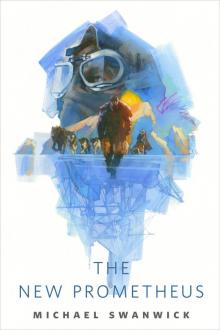 The New Prometheus
The New Prometheus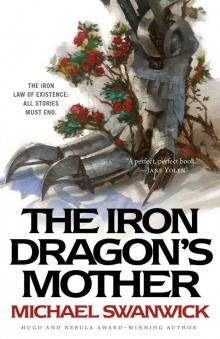 The Iron Dragon’s Mother
The Iron Dragon’s Mother The Mongolian Wizard Stories
The Mongolian Wizard Stories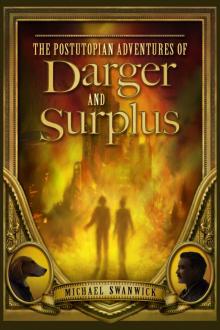 The Postutopian Adventures of Darger and Surplus
The Postutopian Adventures of Darger and Surplus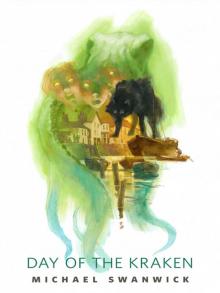 Day of the Kraken
Day of the Kraken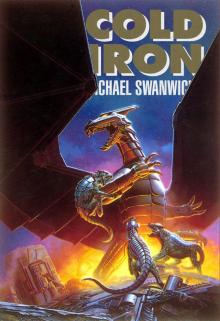 Cold Iron
Cold Iron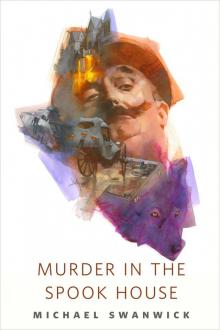 Murder in the Spook House: A Tor.com Original
Murder in the Spook House: A Tor.com Original Radio Waves
Radio Waves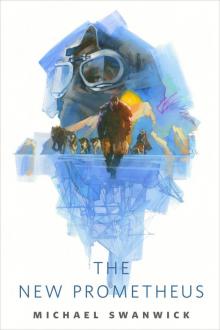 The New Prometheus: A Tor.com Original
The New Prometheus: A Tor.com Original Stations of the Tide
Stations of the Tide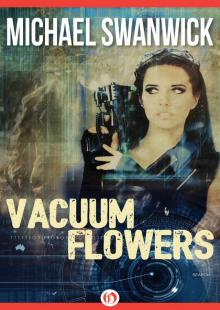 Vacuum Flowers
Vacuum Flowers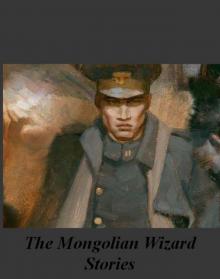 The Mongolian Wizard Stories (online stories 1-7)
The Mongolian Wizard Stories (online stories 1-7)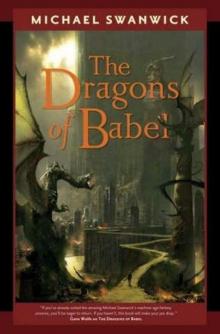 The Dragons of Babel
The Dragons of Babel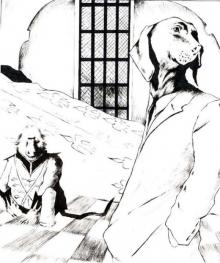 The Dog Said Bow-Wow
The Dog Said Bow-Wow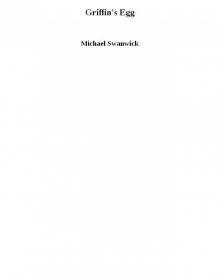 Griffin's Egg
Griffin's Egg The Best of Michael Swanwick
The Best of Michael Swanwick Not So Much, Said the Cat
Not So Much, Said the Cat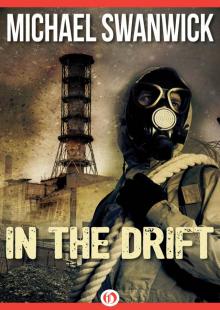 In the Drift
In the Drift Vacumn Flowers
Vacumn Flowers Slow Life
Slow Life The Wisdom Of Old Earth
The Wisdom Of Old Earth Legions In Time
Legions In Time Scherzo with Tyrannosaur
Scherzo with Tyrannosaur The Year's Best Science Fiction (2008 Edition)
The Year's Best Science Fiction (2008 Edition)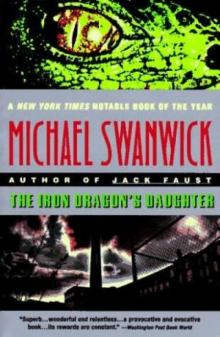 The Iron Dragon's Daughter
The Iron Dragon's Daughter The Very Pulse of the Machine
The Very Pulse of the Machine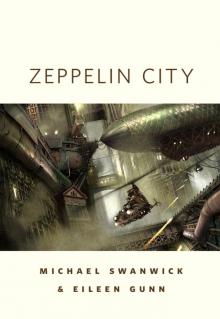 Zeppelin City
Zeppelin City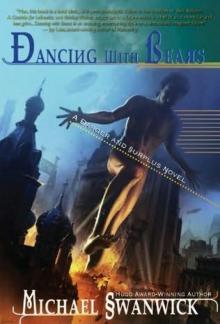 Dancing with Bears
Dancing with Bears Bones of the Earth
Bones of the Earth Tales of Old Earth
Tales of Old Earth Trojan Horse
Trojan Horse Radiant Doors
Radiant Doors